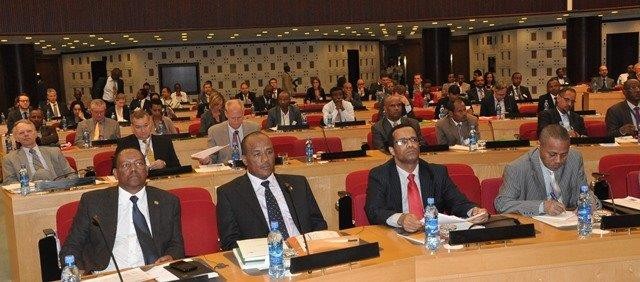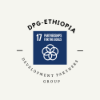Breadcrumb

Development partners and Government ministers have conducted the final leg of national consultations on the forthcoming successor Growth and Transformation Plan (GTP II). This consultation comes just ten days before the draft national plan is submitted to National Planning Council (NPC) and parliament for endorsement.
Chaired by Mr Ahmed Shide, State Minister at the Ministry of Finance and Economic Cooperation (MoFEC), this consultation was attended by over 300 representatives from the donor community, diplomatic corps, government and heads of UN agencies in Ethiopia.
State Minister Shide said that the gathering was part of a ‘tradition’ set at the beginning of GTP I ‘to engage with development partners on draft plans, have a consensus on its main objectives, plans and targets and in addition to solicit support’.
Delivering opening remarks, Minister Abdulaziz Mohammed (MoFEC) noted that Ethiopia has made tremendous social and economic gains in the last 5 years and that this ‘stride demonstrates our viability’ forward. He thanked development partners saying that their contribution was ‘commendable’ in the GTP I period and also underlining that Government’s commitment will continue as the national development plan is aligned with three key pillars in the Sustainable Development Goals (SDGs) that seek to foster economic development, social and environmental protection advancement goals. Plans for enhancing good governance require special focus on mobilizing domestic resources he added, and for this there is need to ‘build stronger partnerships locally and with development partners’. He called on development partners’ support through ‘open dialogue’ in ‘technical assistance and capacity building’ also saying that GTP II would harness such partnerships taking into account that Ethiopia’s development is a ‘responsibility of multiple stakeholders’.
GTP I was described as ‘ambitious’ but ‘we are determined to aim high given the critical importance of addressing our accumulated development deficits’, noted Dr Yinager Dessie, Minister at the National Planning Commission (NPC) ahead of a presentation by Deputy Commissioner of NPC, Mr Getachew Adem who gave an overview of GTP I achievements, challenges and opportunities for continuing sustainable development work initiated in the last 4 years. According to Mr Getachew, a main shift between GTP I and GTP II is the fact that the former focused on agriculture while the latter will give greater emphasis to industrial growth, particularly the manufacturing sector. In the 2010/11 and 2013/14 GTP period, real Gross Domestic Product (GDP) growth rates for three key sectors namely, agriculture, industry and services accounted for 6.6%, 20.0% and 10.7% respectively. Efforts in agricultural transformation enabled ‘farmers to shift to high yield crops’ through ‘irrigation development, water harvesting and river diversion’ while in industry, small and micro enterprises were created and strengthened.
On the other hand, Mr. Getachew added that despite ‘significant improvements in domestic saving mobilization over the last four years, the gap between the investment requirements and the level of domestic savings has widened’, an issue that would have to be addressed in GTP II.
In depth discussions on macro economy, productive economic, social and infrastructure sectors as well as capacity building and good governance were then held to come up with development partner recommendations for GTP II.
Speaking on behalf of the Development Assistance Group (DAG) in Ethiopia, DAG Co-chair, Mr Paul Sherlock mentioned three priority DAG support areas for Ethiopia including sustainable growth, provision of quality basic services and ensuring inclusive development. Acknowledging Ethiopia’s successes, Mr. Sherlock said that ‘poverty has fallen, from close to 40% in 2010 to 26% in 2013. In absolute terms, 2.5 million people (50,000 people per year) have been pulled out of poverty’. He also mentioned some gaps that would have to be addressed in the GTP II period such as greater inclusive development to provide more opportunities for women and youth and low-land areas, ensuring delivery of quality basic service and sustainable growth that takes into account unforeseen external shocks such as the global economic, environment and climate change effects.
H.E. Prime Minister Hailemariam Desalegn of Ethiopia in joining the consultations said that ‘issues raised were pertinent’ referring to recommendations put forward by the development community. In his reflections, Prime Minster Desalegn highlighted that ‘Ethiopia aspires to become a leader in light manufacturing, a sector government is ‘keen’ to see moving forward. He further stated examples of light manufacturing such textile, apparel, leather and agro processing, which he termed as ‘key areas where Ethiopia wants to secure more support’. ‘We are getting aggressive in designing industrial parks expecting $1b of revenue (export earnings) – these will help attract more foreign direct investment (FDI)’; moreover, the ‘local private sector is engaged in this sector’. Adding that there is ‘need to diversify exports especially in the mining sector and tourism’, Prime Minister Desalegn said that government has ‘crafted strategies to address a widening gap between imports and exports’. On macro economy, Prime Minister Desalegn disclosed that government plans to boost local potentials for domestic savings to increase 30% in GTP II period. Ethiopia is behind the Sub-Sahara Africa (SSA) average with regards to the tax-to-GDP ratio, which government intends to increase to 4%. He called on development partners’ to provide capacity building support on ‘how to collect taxes and better tax administration reforms’; in other words governance and accountability. Noting that Ethiopia needs ‘additional financing’, Prime Minister Desalegn stressed that ‘public finances are essential and that government savings are also important. Ethiopia stands at 60% capital expenditure against 40% recurrent expenditure and this needs to change’ a higher recurrent budget is required to maintain quality of public services.
Ethiopian public financial system does not take into account public profit making institutions, which are administered sparely. With respect to recommendations raised about the banking sector, Prime Minister Desalegn said that government plans seek to ‘make the domestic private sector competitive’. On debt sustainability, the prime minister said that Ethiopia can mitigate associated risks through its large scale investments in the power sector, citing the potential that the Gilgel Gibe III projects and others brings to Ethiopia through export earnings once completed, which will in turn be used to service debts.
In closing, Prime Minister Desalegn and State Minister Shide thanked development partners for support Ethiopia received throughout GTP I phase and expressed the government’s commitment for enhancing the partnership throughout GTP II period.
